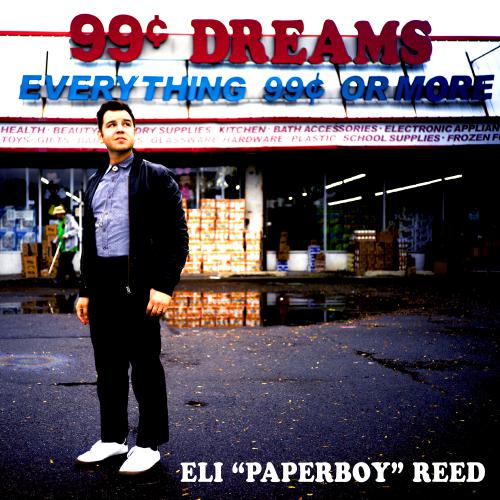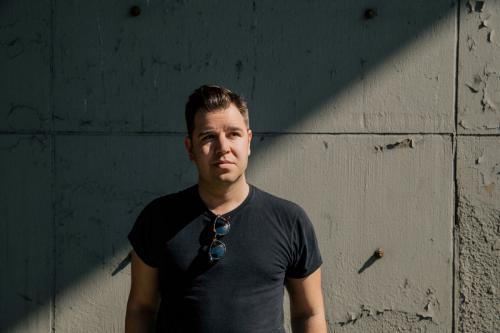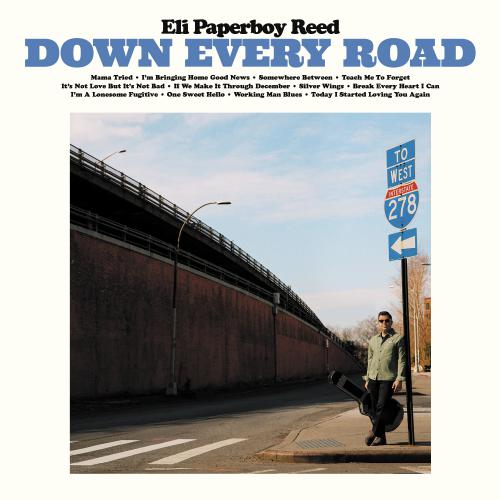Band: Eli Paperboy Reed
Album: Down Every Road
VÖ: 29.04.2022
Label: Yep Roc / Bertus Musikvertrieb GmbH
Website: http://www.elipaperboyreed.com
Es ist ein gewagtes Unterfangen Soul und Country zusammenzubringen. Denn zwischen Country und Soul scheinen Welten zu liegen, aber auf der neuen Sammlung von Eli Paperboy Reed - Down Every Road (erscheint am 29. April bei Yep Roc Records) - kommen sie kraftvoll zusammen: eine "inspirierte und rohe" (NPR) Hommage des Musikers an die Country-Legende Merle Haggard.
Erste Single - "MAMA TRIED" https://ffm.to/downeveryroad
Reed, der vor allem als Soul-Shouter und Balladensänger bekannt ist, meldet sich mit einem zwölf Songs umfassenden Album zurück, das seine Country-Wurzeln offenbart, die bis in seine Kindheit zurückreichen. Schon in den ersten Tagen, als er die Plattensammlung seines Vaters durchstöberte, war es die Country-Musik, die Reeds Fantasie anregte: die Stimme von George Jones, die Haltung von Waylon Jennings und vor allem das Songwriting von Merle Haggard. "Es war so aggressiv ehrlich und kantig", erinnert sich Reed an das erste Hören von Haggard. "Er konnte diese außerordentlich komplizierten emotionalen Gefühle in zweieinhalb Minuten auf den Punkt bringen, und das war etwas, das bei mir wirklich hängen blieb. Schon Jahre vor seiner erstklassigen Ausbildung in den Juke Joints von Mississippi und den Gospelchören von Chicago war es Merle, der diesen Soulman auf den Weg zu dem gefeierten Schöpfer, Interpreten und Kurator der amerikanischen Musik brachte, der er heute ist.
Down Every Road entspringt einer Idee, die Reed schon seit den Anfängen seiner Karriere verfolgt, nämlich Haggards Favoriten der Soulmusik gegenüberzustellen, für die er in seinem eigenen gefeierten Werk am bekanntesten geworden ist. Reed behält fast alle Originalmelodien und -songstrukturen der Country-Legende bei, fügt aber eine von Pops Staples inspirierte Gitarre, die Markenzeichen der FAME-Produktion, Stax-Hörner, einen heftigen, kathartischen Gesang und Orgeln hinzu, die den Soul von Memphis beschwören. Letztendlich beweist er mit dieser respektvollen, aber radikal überarbeiteten Herangehensweise, dass das Herz, der Mut und die Wahrheit, die im Kern von Merle Haggards Songwriting stecken, sich über alle Genres hinwegsetzen.
Bio:
“Country and soul music have always been two parts of the same stream,” says Eli Paperboy Reed. “The influence flows in both directions.”
Take a listen to Reed’s exceptional new album, Down Every Road (Yep Roc Records), and you’ll hear exactly what he means. Recorded in Brooklyn with longtime collaborator Vince Chiarito (Black Pumas, Charles Bradley), the record finds Reed reimagining a host of vintage Haggard tunes as classic soul rave-ups, tapping into all the hurt and heartache of the country legend’s iconic catalog and channeling it into explosive, high-octane performances fueled by punchy horns and ecstatic vocals. Reed’s guitar playing here is more Pops Staples than Roy Nichols, and the production more FAME than Bakersfield, but there’s an obvious reverence underlying the whole project, a deep well of respect and knowledge that allows Reed to inhabit the songs and make them his own without sacrificing an ounce of honesty or integrity. He changes little in the way of melody and architecture on the album, instead recasting the arrangements to present Haggard’s tunes in an entirely new context, one that blurs the lines of genre, geography, and race to reveal the common, distinctly American threads tying them all together.
“I really don’t think you can say enough about the intersection of country and soul music in American culture,” says Reed. “In the 60’s and 70’s in particular, you had covers going both directions and becoming big hits with both black and white audiences, and that was because underneath all the labeling and the marketing, you had songs that spoke to something fundamentally human in all of us.”
It was that fundamental humanity that drew Reed to country music in the first place. Growing up in Massachusetts, he was introduced to Haggard by his father, whose extensive record collection contained a wide array of both old-school and contemporary country songwriters. Though Reed found much to love in George Jones and Waylon Jennings, there was something about Merle that stood out from all the rest, something that captured his imagination in a way that few other singers and songwriters ever have.
“His music was more adult, more aggressively honest and edgy,” reflects Reed. “He could get to the heart of these extraordinarily complicated emotional sentiments in two-and-a-half minutes, and that was something that really stuck with me as I began to find my own path as a songwriter.”
Reed’s path would eventually take him to Clarksdale, MS, where he immersed himself in the juke joint culture of the Delta as a teenager, and the south side of Chicago, where he played piano and organ in the church of famed gospel singer Mitty Collier in his twenties. In 2008, Reed returned to the Boston area and began turning heads with a series of studio albums that earned widespread critical acclaim, with NPR hailing his music as “inspired, raw and powerful” and Uncut lauding its “urgent, electric energy.” The records landed Reed multiple major label deals, scores of song placements in film and television, and festival dates around the world as he established himself as one of the most compelling and consistent soul men of his time. Along the way, he often toyed with the idea of paying tribute to Haggard, recording a tune here or working up an arrangement there, but the relentless pace of his schedule ensured that the project remained little more than a daydream until the spring of 2020, when the COVID-19 brought much of the music industry to a grinding halt.
“With touring off the table for an entire year, it felt like the perfect time to tackle my wishlist,” says Reed, “and this album was at the top of it.”
Teaming up with Chiarito and frequent bandmates Mike Montgomery (bass) and Noah Rubin (drums), Reed cut the core of the album live on the floor at Hive Mind Recording in Bushwick, capturing raw and intuitive performances that offered little opportunity to overthink or second guess things.
“I purposely didn’t send the guys the originals,” explains Reed. “I wasn’t interested in having them recreate anything. I wanted them to just interpret what I was bringing to the table with my guitar and vocals in the moment and play what felt right.”
It’s that balance of respect and reinvention that propels the record beyond the realm of tribute and elevates it into something wholly original and unique. Album opener “Mama Tried” sets the stage, with Reed fearlessly tackling the collection’s most well-known Haggard tune right out of the gate. Memphis organ and Stax horns replace Haggard’s twangy guitars and shuffling rhythm here, as Reed’s blistering vocals burst from the speakers and transform the laidback melancholy of the original into a fierce and defiant desperation.
“Merle was never a screamer,” explains Reed. “He kept everything simmering just below the surface. But I wanted to see what kind of catharsis could happen if you cut loose and finally unleashed all of that raw emotion.”
The effect is intoxicating. Tracks like the profoundly funky “I’m Bringing Home Good News” and vivacious “It’s Not Love But It’s Not Bad” channel the energy and flash of James Brown or Wilson Pickett, while suave, debonair takes on tunes like “I Am A Lonesome Fugitive” and “Silver Wings” hint more at the uptown cool of Chuck Jackson or Major Lance, and Reed’s rich, velvety vocals on songs like “One Sweet Hello” and “Teach Me To Forget” offer nods to Sam Cooke and Jackie Wilson. No matter whether he’s shouting or crooning, though, Reed manages to breathe urgent, insistent life into the lyrics, which still sound just as vital and visceral as the day they were written.
“People often think of country music as being all about story songs,” says Reed, “but Merle wrote moment songs. Like the best blues and soul artists, he captured what his protagonists were feeling in the exact moment they were singing it to you, and there’s an undeniable immediacy to that.”
Perhaps no moment on the record is more arresting than album closer “Today I Started Loving You Again,” which Reed performs here with an assist from New Orleans singer and songwriter Sabine McCalla.
“Back in 1969, Capitol Records commissioned a duet version of this song from Buck Owens, who was their biggest country star, and Betty Swan, who was their most successful soul singer,” says Reed. “The label ultimately shelved it out of fears that an interracial collaboration would damage Buck’s career, but a few of the acetates eventually leaked out, and I happen to own one of them.”
When Reed called McCalla and explained the story and his vision for resurrecting the long lost duet, she gladly stepped into Swan’s shoes and helped deliver an unforgettable—and long overdue—rendition.
“It’s probably the most straight ahead interpretation on the album, and that’s the way I wanted it,” Reed explains. “The arrangement was good enough to be released back in 1969, but it never had a chance to get the respect it deserved. To finally, officially put that song out as a duet with a woman of color after all these years feels consequential to me.”
It also cuts to the very heart of what this record is all about, reaffirming that country and soul music are and always have been inextricably linked in ways that transcend whatever racial, social, and commercial divisions we’ve been sold through the decades. They are indeed two parts of the same stream, and Eli Paperboy Reed is here to baptize us in its waters.
Vorherige Infos:
Band: Eli Paperboy Reed
Album: 99 Cent Dreams
VÖ: 12.04.2019
Label: Yep Roc / Bertus Musikvertrieb GmbH
Website: http://www.elipaperboyreed.com
With the release of his new record, ‘99 Cent Dreams,’ Eli “Paperboy” Reed begins his second decade as an artist much in the same way he began his first: completely and utterly in love with soul music. Reed is ten years older and ten years wiser this time around, though, writing with the kind of freewheeling confidence that can only come from experience, and the result is the finest and most emotionally sophisticated music of his career. Cut at the legendary Sam Phillips Recording in Memphis, TN, and produced by Matt Ross-Spang (Jason Isbell, Margo Price), ‘99 Cent Dreams’ is an exuberant and uplifting collection, a celebration of life and love delivered by an ecstatic messenger who’s still in profound awe of the power of both. Reed’s arrangements on the album are lean and muscular, filtering vintage R&B, soul, and gospel through the heart of a modern songwriter. His stunning voice remains front and center, of course, but his performances here have grown in their assurance and matured in their delivery, a sign perhaps of the newfound perspective he’s gained with fatherhood.
“My daughter is two years old now, and she’s completely changed the way I approach music,” says Reed. “Having a child alters your perception of time and teaches you to get right to the heart of things. When I started writing these songs, all I wanted to do was tap into the root of what it is that I love about soul music.”
The new album follows the Boston-via-Mississippi singer’s universally lauded 2016 release, ‘My Way Home,’ a comeback record of sorts that rose from the ashes of a doomed major label deal. Hailed as “inspired, raw and powerful” by NPR and praised for its “urgent, electric energy” by Uncut, the album marked the beginning of Reed’s fruitful relationship with Yep Roc Records (who will also reissue his 2008 debut album, ‘Roll With You’) and showcased his resilient spirit and rafter-raising voice. The songs harkened back to the timeless music he fell in love with as a young man playing organ and guitar in the Chicago church established by gospel legend Mitty Collier, and they helped him process the wild journey he’d been through.
“After the whole major label debacle, I needed to make that record,” explains Reed. “This time around, though, I wanted to move the needle in the other direction and make something a little more thoughtful and measured. I wanted to make music that was representative of where I was in my life, music that was a bit more grown up.”
For Reed, that meant stripping away any sense of artifice and building his songs from the ground up. He went back to writing on an acoustic guitar with just a pad and pen by his side, inviting friends over to his Brooklyn apartment to collaborate on music while his daughter was at daycare. He wrote without agenda, creating simply for the sheer joy of it, and he let the songs tell him when they were ready.
“I’m a firm believer that if a song doesn’t grab you in its simplest of form, then it’s probably not going to grab you no matter how much bullshit you add on top of it,” Reed says with a laugh. “That was my guiding principle when I was writing, and that continued to be the guiding principle in the studio.”
In Memphis, Reed and his band were joined by drummer Ken Coomer (Wilco, Uncle Tupelo) for a series of whirlwind recording sessions that resulted in a fully mixed album in just nine days. Nearly everything on the record was captured live, including Reed’s pulse-pounding vocals, which made their way through the same echo chamber used by the likes of Bob Dylan, Roy Orbison, Levon Helm, Johnny Cash, and Robert Plant.
“Sam Phillips built that studio in 1960 after he grew out of Sun, and it really hasn’t changed,” says Reed. “It’s an amazing space, and the sound of the room is just incredible. When you’re in there recording and hearing the vocals coming back at you through the echo chamber, it already sounds like it’s supposed to.”
The record opens up with the infectious groove of “News You Can Use,” a freewheeling meditation on appreciating what you’ve got that sets the stage for an album all about happiness, fulfillment, and gratitude. On the soulful “Said She Would,” Reed pays tribute to a forever kind of love, while the high-octane, horn-fueled “Trying” honors the little ways lovers lift each other up, and the joyously playful “Holiday” finds reason to celebrate the ordinary. “Today’s the kind of day where I just wanna share all my love with you,” Reed sings over a swaggering Memphis groove. “If I say and you say, let’s make today a holiday.”
“That song went through a lot of forms, but when we got into the room at Sam Phillips, everybody just fell into the pocket,” he explains. “We even played fake bongos on the back of a guitar to give it an Al Green feel.”
Humor and heart have long been Reed’s trademarks, and ‘99 Cent Dreams’ does a remarkable job of balancing the two. The tongue-in-cheek “Coulda Had This” self-deprecatingly shows off for an old flame, while the slippery “Bank Robber” is delivered with a Sam Cooke wink, and the nostalgic title track channels those long-gone summer days of childhood with a wistful smile. Throughout the record, Reed’s spectacular voice is complemented by appearances from legendary Memphis vocal group The Masqueraders, who join on several tunes including the poignant album closer “Couldn’t Find A Way.”
“When they were out in the studio singing, they all had their arms around each other,” remembers Reed. “These guys have been singing together for 50 years, and I’m watching the three of them with their arms around each other all singing into one microphone. It’s something I’ll never forget.”
It’s hard to picture a more fitting image for an album so fueled by love and hope and companionship. ‘99 Cent Dreams’ is not without its moments of loneliness and pain but it ultimately insists on seeing the bigger picture, on recognizing each and every day for the gift that it is, on letting go of expectation and embracing the unifying power of love and music. As Reed sings on “A New Song,” “I’ve got to find a new song, with a happy melody / I got to find a new song to set my spirit free / I can sing it when I’m lonely and sing it when I’m sad / And maybe when I get through singing I won’t feel so bad.”
With ‘99 Cent Dreams,’ it’s safe to say that Eli “Paperboy” Reed has found that new song.





